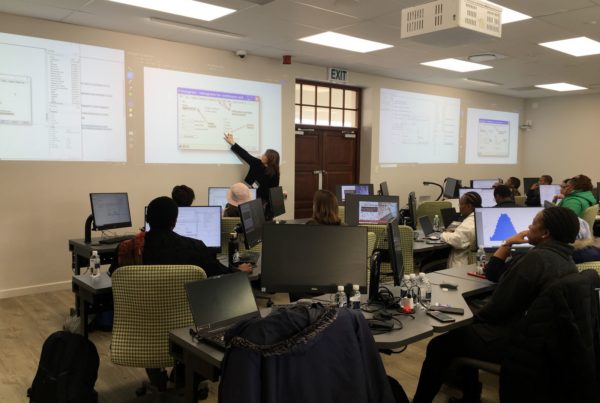South Africa’s labour market remains a priority concern for policymakers and academics. With President Ramaphosa targeting an additional 2 million jobs in his State of the Nation Address, proposals to achieve these ambitious goals require continuous debate and research. RESEP maintains its focus on being a leading institute for socio-economic policy research, with empirical labour market analysis one of its core focus areas. On 20 and 21 June 2019, the labour group within RESEP hosted a small, successful workshop on The Labour Market in a Macro-economic Context at the Stellenbosch Institute for Advanced Studies (STIAS). This created a forum to discuss the labour market from multiple perspectives; academics and policymakers interacted and traded views; development economists, macroeconomists and political economists contributed from their various points of expertise. Tito Mboweni, minister of finance and honorary professor of Economics at Stellenbosch University, led a closed discussion on the current state of the economy. Kuben Naidoo, deputy governor of the South African Reserve Bank and also honorary professor of Economics at Stellenbosch University, contributed to the debate on wage formation and monetary policy. Andrew Donaldson, formerly from National Treasury, provided varying insights on both macro- and microeconomic aspects that play into the current state of the labour market, while Hugo Pienaar from the Bureau for Economic Research provided a prognosis for economic growth and the potential for the labour market to expand. Steven Friedman, a political scientist at the University of Johannesburg, provided a critical overview of the status and role of trade unions in the labour market. RESEP researchers contributed insightful new empirical findings on economic growth, education, active labour market policies, the informal sector, job search, job polarisation and the fourth industrial revolution, affirmative action, minimum wages, firm structure and top income inequality. The workshop raised many questions and provided an impetus for new ways of thinking about solutions to South Africa’s labour market challenges.
Popular Posts
Other Readings
- Repetition and dropout in South Africa before, during and after COVID-19 January 15, 2024
- COVID-19 and inequality in reading outcomes in South Africa: PIRLS 2016 and 2021 December 23, 2023
- What rich new education data can tell us December 22, 2023
- Early Grade Repetition in South Africa: Implications for Reading November 15, 2023
- The Impact of Agricultural Minimum Wages on Worker Flows in South Africa November 14, 2023
Related Posts
 Conferences and WorkshopsNews and Opinion
Conferences and WorkshopsNews and Opinion
Resep quantitative analysis course in the economics of education
Ryno PageJuly 12, 2024
EducationHealthNews and OpinionResearch Outputs

Assessment matters: What can we understand about the National Senior Certificate results during COVID-19 from university entrance exams?
Ryno PageMay 25, 2024
 AuthorsEducationEducation - Reports & PolicyEducation - Working PapersMartin GustafssonNews and OpinionUncategorized
AuthorsEducationEducation - Reports & PolicyEducation - Working PapersMartin GustafssonNews and OpinionUncategorized
A brief look behind the flat 2015 to 2019 TIMSS Grade 5 trend for South Africa
Ryno PageApril 13, 2024





